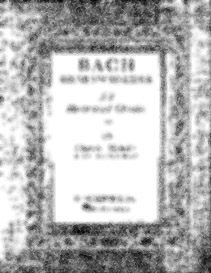Bach Unplugged, ca. 1941
A Manuscript Unearthed by Prof. Charlotte Jacobs, 2012
[Peter Lieberson in memoriam]
[Ed note: In late 2012, Prof. Charlotte Jacobs discovered a long-lost manuscript of the familiar, unattributed music theory text Bach Unplugged: Voices Unencumbered by the Voice, known heretofore only through its edited and updated edition disseminated for university use beginning in the 1950s. The manuscript includes a “Note to the Instructor,” excised in all published editions, which does much to explain the confounding rationale of music theory teaching in the latter half of the twentieth century. Its writing style, as much early-century dreamy stream of consciousness as mid-century modern streamlined rational, remains a subject of speculation, though it is suspected that its cookbook-like instructions point to a female author, which in turn may explain why the text has for so long remained unattributed.]
Extract chorales from cantatas from historical context from sacred ritual from specter of anti-Semitism. Strip off texts too and play on piano to obscure any hint of registral identity or timbral character or vocal sensibility as well as illegitimacies such as crossed voices or prohibited melodic intervals. Direct initiates to remember conceived for voice but continue to play on piano to encourage conjuring of the voices in the inner ear rather than the auditory reality of the voice which is too easy and it’s especially good for the instructor to play badly like a composer whose creative work precludes getting his [sic] hands dirty. Remember not to mention Bach did not write the tunes (it’ll just confuse them with extraneous notions of historical contingency and undermine the power of the individual author) and definitely don’t point out that the tunes are often odd and pre-tonal and demand harmonic realizations that are less about explicit or consistent tonal function but are modal and unpredictable. Avoid observing that some of the most interesting aspects of musical works are ambiguous or involve a dialogue between convention and idiosyncrasy with the ear leading rather than a dogmatic rulebook guaranteed to achieve success by unthinking obedience but instead give them a list of incontrovertible traffic regulations of what not to do without any discussion of what is of value and stay away from any acknowledgment that musical syntax is a marvelous voluntary mass delusion, in which we agree to conspire in believing that the way invisible patterns move in the aether has some sense and order to it and that it is a matter of acoustical and aesthetic virtue rather than contingent upon environment, training, and idiom. When you play through chorales in class (badly if possible), say, ooh, isn’t Bach a genius for crossing voices and frustrating the leading tone and using those weird unexpected chords at that spot?
In private lessons, abandon all the above, but ask, “Are you sure you want that octave there?” (Octaves, in any century, are high-maintenance.) Listen to your student’s concern about her own creative future, and encourage her to learn by exploring the “resistance” she so fears. She will. Remember her when you bump into one another twenty years later, and compliment her graciously on her creative growth and professional accomplishments.
She will learn from you and thank you, she will remember the transcendent cello solo in your Piano Concerto, and she think of you when she in turn mentors the next generation. She will mourn you when you depart.

